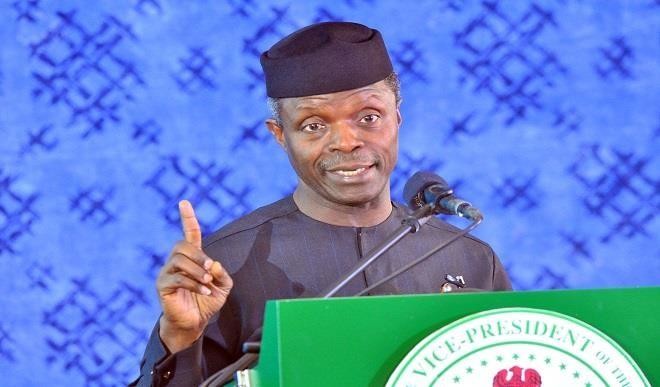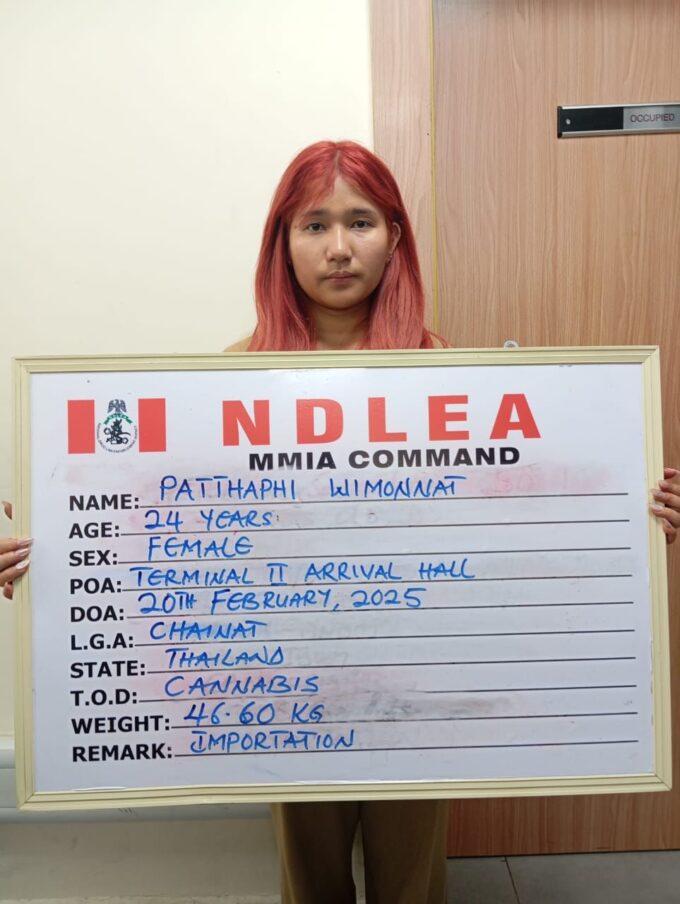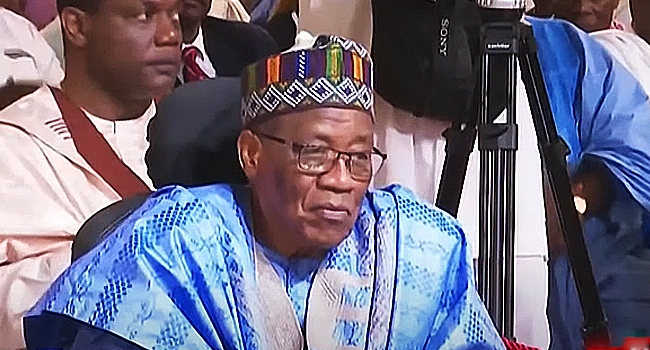Nigeria’s Vice President, Prof. Yemi Osinbajo has challenged African governments on the need to strengthen institutions to fight corruption, saying it imposes a moral obligation to fight it with vigour and political will, by strengthening all institutions and systems involved in law enforcement, as well as in promoting a culture of transparency and accountability
In his remarks at the 8th Commonwealth Conference of Heads of Anti-Corruption Agencies in Africa in Abuja on Monday, he said while public sector corruption was the usual focus, the private sector’s complicity was significant, especially with large multinational corporations engage in tax evasion or transfer pricing.
“But it is the complex web of public-private collusion and connivance that results in proceeds of corruption ending up in foreign countries and, especially, in their financial institutions and systems. Dismantling the conspiracies that facilitate export of stolen assets is probably as important as the theme of this conference which is “Partnering towards Assets Recovery and Return,” he said.
“It underscores the fact that fighting corruption is futile if we do not ensure that the proceeds of corruption find no safe haven. And that such proceeds are fully recovered and promptly repatriated. Recovering stolen assets not only accomplishes the goal of restitution, it also serves as a potential deterrent to future corruption.
“The fight against corruption is far more sophisticated, vicious and nuanced than ever before. In many of our countries it is in the nature of State Capture, where the strongest arms of the polity is the corrupt superstructure, represented in the formal and informal structures of the state and society. So when corruption fights back in such systems, the courage and commitment of agency operatives is not enough. We must provide adequate resources to investigate, adequately equip operatives, protect their families, and protect whistle-blowers and witnesses.” – Vice President
FULL TEXT of SPEECH
It is a special pleasure to join you at this 8th Commonwealth Conference of Heads of Anti-Corruption Agencies in Africa. I speak to the converted when I say that for us in Africa, corruption continues to be one of the greatest challenges of our time; a problem that threatens the very existence, and continued survival of our societies.
It has been rightly described as a crime against humanity, because of the implications on the lives and livelihoods of all, especially the poorest. It undermines democracy and the rule of law, distorts markets, erodes the quality of life, allows organized crime and terrorism to flourish, and triggers needless wars and bloodshed. And indeed, much has been lost and is still being lost. A report that may be cited in this gathering is the one by the One Campaign, titled the “One Trillion Dollar Scandal.”
The 2014 report claims that developing countries lose $1 trillion annually to corporate transgressions, most of it traceable to the activities of companies with secret ownership.
Another report that may enjoy a major mention here is the 2015 report of the High Level Panel on Illicit Financial Flows from Africa. Chaired by our guest of honour, former South African President, Thabo Mbeki, the panel concluded in its report that Africa had lost over $1 trillion over a 50-year period and that Africa loses more than $50 billion annually to illicit financial flows. Most of these illicit flows are perpetrated in the extractive sector and many through companies with hidden ownerships.
The cost of corruption, therefore, imposes on all African countries and governments a moral obligation to fight it with vigour and political will, by strengthening all institutions and systems involved in law enforcement, as well as in promoting a culture of transparency and accountability.
While public sector corruption is the usual focus, the private sector’s complicity is significant, especially with large multinational corporations engage in tax evasion or transfer pricing.
But it is the complex web of public-private collusion and connivance that results in proceeds of corruption ending up in foreign countries and, especially, in their financial institutions and systems. Dismantling the conspiracies that facilitate export of stolen assets is probably as important as the theme of this conference which is “Partnering towards Assets Recovery and Return.”
It underscores the fact that fighting corruption is futile if we do not ensure that the proceeds of corruption find no safe haven. And that such proceeds are fully recovered and promptly repatriated. Recovering stolen assets not only accomplishes the goal of restitution, it also serves as a potential deterrent to future corruption. Article 51 of the United Nations Convention Against Corruption states unequivocally, that return of assets is a fundamental principle of the Convention, and mandates States Parties to afford one another the widest measure of cooperation and assistance in this regard. Similarly, Article 16(1)(c) of the African Union Convention for Preventing and Combating Corruption, obligates States Parties to adopt such legislative measures as to enable repatriation of proceeds of corruption.
The effective implementation of these Conventions depends to a considerable extent, on the willingness, cooperation and the assistance of States, in the areas of mutual legal assistance (MLA), law enforcement cooperation, asset recovery and return, and technical assistance. Regrettably, the procedures to obtain Mutual Legal Assistance to seize, confiscate and repatriate proceeds of corruption, are often so complex and problematic, and are certainly in urgent need of reform.
The absence of a legal basis for cooperation in some countries, differences in legal and procedural frameworks, language barriers, bank secrecy rules, jurisdictional issues, a lack of funding – are some of the obstacles standing in the way of effective mutual legal assistance.
It is heart-warming to note that there is evidence of a renewed commitment to collectively identify the most effective means of overcoming all of these existing legal and technical obstacles to asset recovery and return.
The Global Forum on Asset Recovery (GFAR), which held its inaugural meeting in Washington DC, in December 2017, is one good example; this latest effort toward facilitating asset recovery and return. The meeting brought together governments from four countries from which resources have been stolen, namely Nigeria, Sri Lanka, Tunisia and Ukraine – and those from countries that tend to be the destinations for these looted resources, to coordinate efforts aimed at identifying those resources and ensuring successful repatriation.
The GFAR saw the signing of a Memorandum of Understanding between Nigeria and the Government of Switzerland, for the return of an additional USD$320 million of the Sani Abacha loot. Included in that agreement is the commitment that the funds would be invested in one of the Nigerian Government’s flagship social investment programmes – a Conditional Cash Transfer scheme, targeted at the poorest and most vulnerable households in the country.
I should point out that Nigeria has been at the forefront of sponsoring Resolutions aimed at enhancing Mutual Legal Assistance and Asset Recovery and Return. In 2015, Nigeria and South Africa, on behalf of African countries, sponsored a resolution titled: “Facilitating International Cooperation in Asset Recovery and the Return of Proceeds to Crime” – Resolution 6/2 of 2015.
This resolution was passed at the 6th Session of the Conference of States Parties of the United Nations Convention against Corruption held in St. Petersburg of the Russian Federation in 2015. Other resolutions include, “Facilitating International Cooperation in Asset Recovery” – Resolution 5/3 of 2013 at Panama City, Panama in 2013; and “Strengthening Mutual Legal Assistance for International Cooperation and Asset Recovery”- Resolution 7/1 2017, in Vienna, Austria in 2017; both of these sponsored exclusively by Nigeria.
Nigeria has also worked hard to mobilize other countries, especially African Countries, around the issue of asset recovery; and we were key participants in the London Anti-Corruption Summit of 2016, which marked a watershed for our administration’s anti-corruption agenda.
Permit me to mention an issue crucial to the asset recovery and repatriation effort; this is the use of anonymous companies, masked corporate ownership of companies and this is deeply implicated in the corruption story. Yes, we know that anonymous companies are not always illegal or are not always designed to harm. But we also know that secrecy provides a convenient cover for the criminal and the corrupt. And we are not just operating from the theoretical or hypothetical standpoint, our lived experience has shown clearly that anonymous corporate ownership serves as vehicles for masking conflict of interests, corruption, tax evasion, money laundering, and even terrorism financing.
If nothing else, the Panama Papers clearly illustrated the global scale and spread of this problem. So this is a global challenge and nothing less than a truly global approach will be needed to tackle it.
This is why we salute the United Kingdom, Norway, Netherlands and Denmark for leading the way in establishing public registers of the real, human owners of companies in their countries. We call on other G8 and G20 countries not only to follow suit, but all of the countries of these bodies should initiate actions to end corporate secrecy especially in some of their dependencies. This is also why we find it laudable that Open Ownership and its partners have established a global register of the beneficial ownership of companies, with entries from about two million companies. It is important to underscore the fact that opacity in one section of the globe undermines openness in the other. We need to break down these walls together.
Distinguished Ladies and Gentlemen, African countries must come together to keep the issue of asset recovery and return on the front-burner of international discourse. Continuing partnerships and collaborations cannot be over-emphasized. I also urge our various governments to embrace the proactive sharing of information; we cannot afford to allow historical suspicions and cynicism to undermine the very important work of fighting corruption and reversing its impact. It is only through collective action that we can stay ahead of the criminal elements who rob our countries and our citizens of their present and their future.
We must also work hard to build cooperation and mutual understanding with our global partners. We must insist that recovered stolen assets be returned to the countries of origin, without any preconditions, in line with Article 51 of UN – CAC.
Furthermore, both requesting and requested States, should agree to apply the highest possible standards of transparency and at all stages not just of the recovery and return process, but also in the management and disposal of recovered and repatriated assets. And it goes without saying that these returned stolen assets must be utilized in a manner that brings maximum benefit to the citizens of the victim country.
In conclusion, may I call on governments of African States to more actively provide funding for anti-corruption agencies. The fight against corruption is far more sophisticated, vicious and nuanced than ever before. In many of our countries it is in the nature of State Capture, where the strongest arms of the polity is the corrupt superstructure, represented in the formal and informal structures of the state and society. So when corruption fights back in such systems, the courage and commitment of agency operatives is not enough. We must provide adequate resources to investigate, adequately equip operatives, protect their families, and protect whistle-blowers and witnesses.
Let me say to you, Heads of Anti-Corruption Agencies in Commonwealth Africa, that you have found yourselves in roles that could change the destinies of your nation, if you deliver on your mandates. You simply cannot afford to fail.
On our part as the Government of Nigeria, we are irrevocably committed to the fight against corruption. I’m sure you’re all aware that the African Union in 2017, designated President Buhari as its Anti-corruption Champion for the year 2018. In that capacity, one of President Buhari’s priorities, is ensuring the realization of a common African position on Asset Recovery and Asset Return.
In closing, I would like to thank the Commonwealth for establishing this body to foster cooperation and peer learning in the daunting but surmountable battle against corruption. I have no doubt, that the resolutions and commitments that will emerge from this conference will be game-changing.
As I wish you very fruitful deliberations, it is now my privilege and pleasure to declare this conference open.














